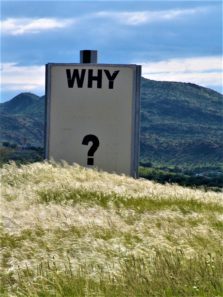Finding Why
Photo by Ken Treloar on Unsplash
“When you know who you are; when your mission is clear and you burn with the inner fire of unbreakable will; no cold can touch your heart; no deluge can dampen your purpose.” Chief Seattle
Last week, I challenged you to take a fresh look at your mission statements to see if they are clear, concise, inspiring, or even accurate. As I said then, I find vision and mission statements, done well, to be useful. As a leader, and now as a consultant, I believe the work of drafting such statements is the first step in developing a team. After a couple of recent experiences working with very different clients, I am even more convinced. Therefore, I’ve decided that last week was the first in a series about mission, vision, and purpose. At the end of the series, I’ll have a “How To” document ready to send to anyone who would like one. To get started, we are going to take a step backward. We’re going to start with purpose.
“What is your job?”
A student asked me that very question shortly after I became a Dean of Students. The question stumped me. For the first time, I was leading a group of departments rather than running a single program. After some reflection, I decided my job was to make sure that the university ‘worked’ for every student who had chosen to be part of it. “Working” meant every student had an opportunity to learn, grow, find their path, and accomplish what they had come to do. I was beginning to understand the purpose of my work.
When I became Vice President for Student Affairs at the University of Texas in San Antonio (UTSA), the Division of Student Affairs had nineteen wildly different departments ranging from Intercollegiate Athletics to the Office of the Registrar. People within and across the departments did varied work, had different training, and, understood their jobs very differently. I realized my job had shifted again. My job now was to make sure the university worked for everyone who was part of it. Now my work included faculty and staff members as well as students. It also needed to work for parents, families, and community members. However, it was unlikely everyone in the division understood their work as I did.
Defining the ‘why.’
That’s when I began to realize the importance of clearly articulating an organizational purpose. While I had started to understand it earlier, at UTSA I had to be able to articulate it more effectively than I had before. My job as a leader of the division was to deeply understand our purpose as an organization and to be able to articulate that purpose to staff members in the division and to stakeholders outside the division. To find that deeply held purpose for your organization, begin asking members and stakeholders ‘why.’ For us, the why was clear, the answer both simple and complex. Our why is the students we serve.
“Why do you do what you do? Why is that important to the people you serve? Why does the existence of your organization matter?” * Use the ideas of Good to Great and the Social Sectors (see 7//19 post) and ask what are you deeply passionate about – and why? What can you be best in the world at and why does it make a difference? What is our impact on the people we serve, and why does it matter?
Mission and vision statements matter. However, before you start writing your vision and mission statements, you need to understand your purpose. You need to start by asking yourself and everyone around you – Why are we here doing this work? Why does it matter – to us and to the world? The first step is to writing strong vision and mission statements is understanding your ‘why.’
FYI – in Wednesday’s newsletter, I’ll share some additional thoughts and resources to help you find purpose for you and for your organization.
*Spence, Jr., R. M. with Rushing, H., (2009) It’s Not What You Sell, It’s What You Stand For, Penguin Group: New York.


I often challenge my graduate students to explore their “why” – why they chose this field, continuing to dig deeper into their answer, asking why of components of each round of answers. This is a useful piece to share with my 2nd years at an upcoming touch base meeting. Thanks.
Hi Brenda, I’m glad you think this post will be helps to the students you work with. One addition as I was thinking about your reply- saying students are our why is accurate and it works well as a shorthand. However, when thinking about our personal why, I’d encourage people to go deeper. Maybe try the Five
Why exercise. Yes, it’s about students, why? I care about transforming lives Why? Etc.
I hope you’ll share how it goes! Thank you for taking the time to comment.